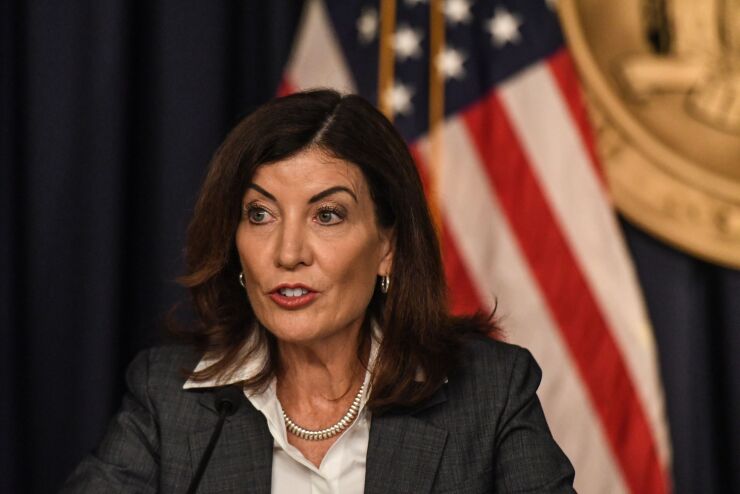
The New York Department of Financial Services has proposed banning state-chartered banks from charging overdraft fees on transactions of $20 or less, as well as other changes aimed at eliminating exploitative bank fees.
On Wednesday, New York's consumer protection agency issued a proposed rule that would also prohibit state-chartered banks from charging overdraft fees that exceed the overdrawn amount. The eight-page
The impact of the proposal would be limited to New York's 52 state-chartered commercial banks and trust companies. New York Governor Kathy Hochul announced the proposed regulation, which she said would enhance consumer protections against overdraft fees for minor transactions.
"It is time that we hold banks accountable and lighten the burden of high overdraft fees for minor transactions to keep New Yorkers' hard-earned money in their pockets," Hochul said in a press release.
State-chartered banks would be banned from processing electronic debit transactions in a manner intended to maximize the number of overdraft and NSF fees. The proposed rule seeks to prohibit deceptive bank fees by banning nonsufficient funds fees for instantaneously declined electronic transactions.
Lawsuits challenging the Consumer Financial Protection Bureau's final rule on medical debt are the latest issues facing banks ahead of Donald Trump's return.
"Today's proposed regulation ensures that consumers will no longer be taxed with surprising and disproportionate fees for using the overdraft services provided by their bank accounts," said Adrienne Harris, the superintendent of the New York State Department of Financial Services, in a press release. "A healthy market grows when consumers have confidence and trust in the products offered and the providers offering them."
Among the other changes, the proposal would ban multiple NSF or overdraft fees for the same transaction and also prohibit charging double fees to cover an overdraft. Banks would be banned from charging an overdraft fee for an electronic transaction when the consumer's account indicates there are sufficient funds at the time the transaction was initiated.
The proposal adheres to changes made in 2023 by the
One practice in particular — known as "authorize positive, settle negative," or APSN — is considered deceptive to consumers. APSN transactions are those authorized when a consumer's available account balance is positive but later posts to the account when the available balance is negative. Regulators have said that the complexity of settling transactions makes it hard for consumers to reasonably anticipate or prepare for such fees, even when banks ostensibly inform customers of such practices.
The proposed rule is open for public comment until Feb. 3.






